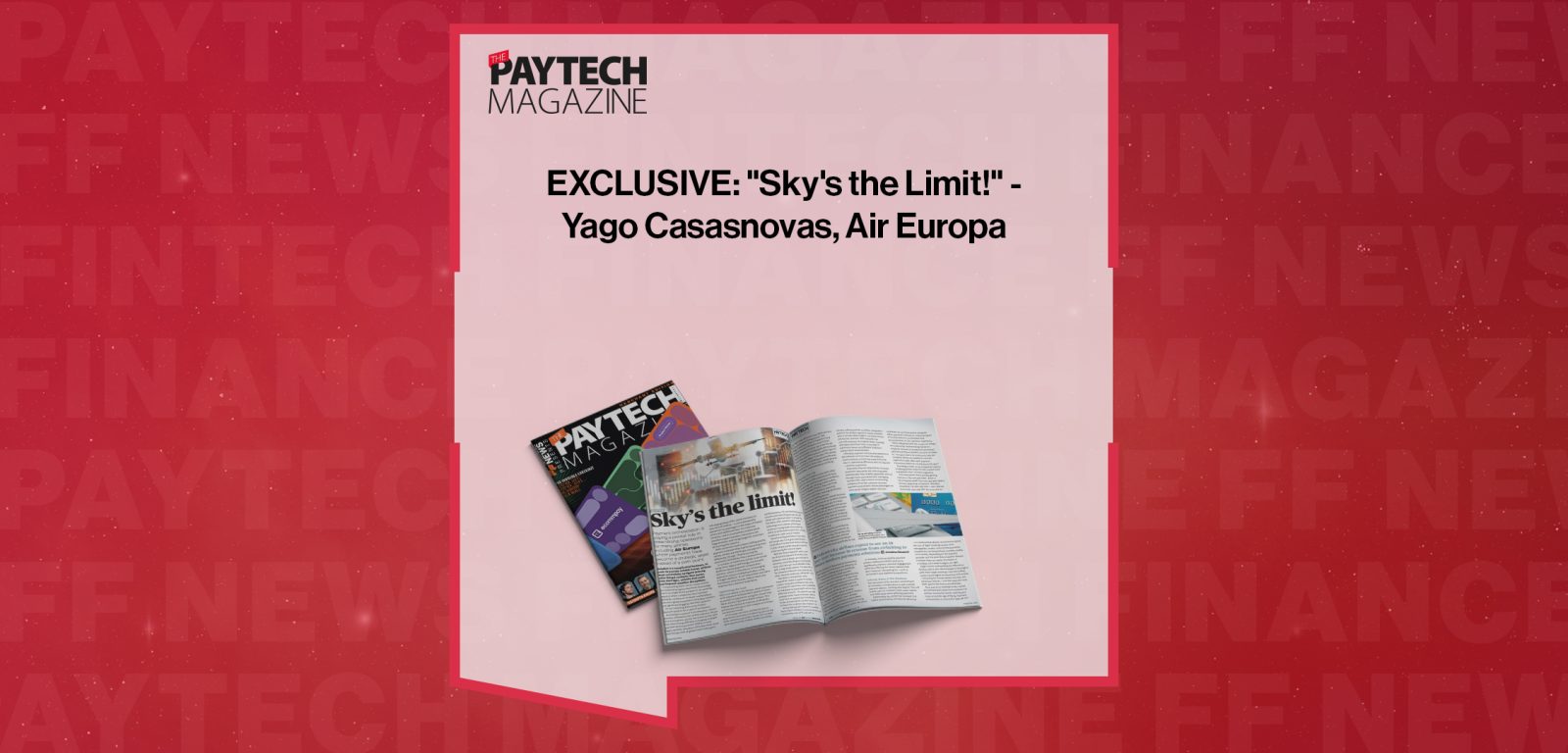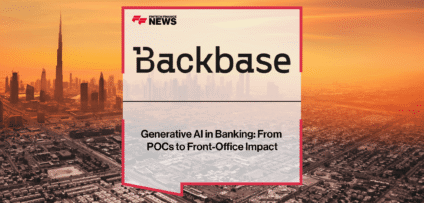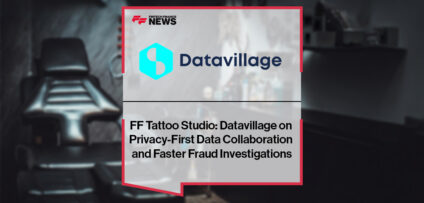Breaking News

EXCLUSIVE: “Sky’s the Limit!” – Yago Casasnovas, Air Europa in ‘The Paytech Magazine’
Payment orchestration is playing a pivotal role in streamlining operations for many airlines, including Air Europa where payments have become a strategic asset instead of a pain point
Aviation is a complicated business. In order to provide reliable travel, airlines must successfully navigate (among other things) multiple time zones, crew shortages, volatile fuel costs and frequent weather disruptions.
Compounding these issues, many airlines are hindered by legacy payments technology that is no longer fit for purpose in an evolving industry where complexity and customer demands continue to increase, marketplaces rule and a global ecosystem of holiday resellers and agents are plugging into their systems. It’s not surprising that many of their payment systems hit a spot of turbulence.
According to research from Amadeus, which provides software to the airline industry, 40 per cent of companies across the travel sector said they were having difficulty managing multiple payment service providers (PSPs) on their legacy systems. Amadeus estimated that more than five per cent of global travel sales goes into paying these PSPs, which translates to around $74.5billion – a cost subsequently passed on to passengers in the shape of steeper prices and additional fees. It’s a lose-lose situation, and in a competitive market where travellers expect seamless interactions, the fragmentation and rising charges for consumers are hurting the industry.
With consumer expectations shifting and the payment methods they look for becoming more varied, airlines are starting to see payments differently, though. They’re turning the payments themselves into a revenue driver. A number of ambitious airlines have moved away from legacy technology and towards platform-based payment orchestration systems, which is the process of managing payments across multiple providers using a single platform. It can help airlines and other businesses save money, reduce fraud, and improve the customer experience.
Lightening the load
One such airline is Air Europa, which partnered with payment orchestration platform Nium to power its payments using the closed-loop Nium Airline Payments (NAP) system. This helped the airline to improve profitability previously tied up in thin margins and slower settlement times. Air Europa has now shifted the dial in payments innovation further by partnering with solutions provider Hands In to enable split payment for tickets within its online purchase process. This provides flexibility and a more customised shopping experience to better suit individual needs. To achieve this, the airline offers Hands In’s split payment technology on its website, which allows customers buying tickets directly from the airline to divide ticket costs between multiple travellers or credit cards at checkout.
Since launching this feature in June 2024, Air Europa says it has generated more than €3.8million in incremental revenue, with over 15,000 unique profiles using split payments, underscoring the customer appeal. With the ‘Group Payments’ option, users can divide the payment of the transaction between several people, personalising the amounts, automatically generating payment links, and making it more affordable to deal with a large travel expense. This option has so far achieved an 87.8 per cent conversion rate when the lead booker pays with the first card.
The ‘Multi Card Payments’ option, meanwhile, makes it possible to purchase a ticket using several different cards, which can make the transaction more accessible for an individual by spreading the cost over their different accounts. This option is also made available when Hands In receives a decline code from an acquirer due to insufficient funds, prompting the customer to retry the transaction using two cards instead of one. Air Europa says this feature has recovered more than €2.4million in revenue and achieved a conversion rate of 95.1 per cent.
“We’re very pleased to have these solutions in our online purchasing process,” said Yago Casasnovas, Head of Payments, Fraud Prevention and Distribution at Air Europa. “They represent a further step in the line we have set ourselves of helping the user to decide how they want their trip to be, which is part of our campaign slogan ‘Tú Decides’ (You decide). The possibility of splitting payments between several people or cards makes shopping easier and further reduces the barriers to flying.”
Paying their way
Air Europa’s mindset is matched by other airlines around the world, which are busy exploring a variety of payment innovations, including open banking, mobile wallets, and embedded finance. They view these innovations as essential to improving customer experience, reducing operational costs, and increasing revenue.
Amadeus’ latest research, released last year, found that airlines are at the forefront of plans to increase technology spend in the travel sector. The study highlighted that full-service airlines expect to see an 18 per cent increase in revenue from switching to more modern payments solutions. And, with an increasing focus on payments as a cornerstone of their service improvement, orchestration platforms are growing in popularity. FinMont, a global payment orchestration platform, recently announced a new tie-up with The Lufthansa Group. The partnership is enhancing payment processes, and also incorporates Camino Network’s blockchain solution that has been built specifically for the travel industry to document all transactions. This helps to further boost the efficiency of the airline’s existing payment workflows.
“Full-service airlines expect to see an 18 per cent increase in revenue from switching to more modern payments solutions”
Travel industry-focussed payment orchestration firm CellPoint Digital has also been in the news recently as it raises new funding to speed up the launch of its Offer Order Service Delivery (OOSD) payment orchestration platform, which it says will ‘transform modern airline retailing’. Another development to watch closely is payment orchestrator Yuno’s strategic partnership with mobility company Meili. This collaboration is aimed at transforming the payments infrastructure within the airline industry, offering airlines a unified, integrated platform for all their payment needs, coupled with actionable data insights and streamlined distribution channels. With features like one-click checkout, AI-enabled smart routing, and robust anti-fraud tools, Yuno says it will ensure ‘secure and efficient’ payment orchestration across borders.
Ultimately, payment orchestration platforms like CellPoint and Yuno have the ability to improve airlines in three key areas: financial returns, operational efficiency, and the big one – customer experience. Financially, they can help airlines to boost conversion rates while also reducing costs. Operationally, they simplify payments and cut through issues associated with managing multiple PSPs. And in terms of removing turbulence from the customer journey, payment orchestration allows passengers to more easily navigate digital channels.
A smoother, more accessible payment process enables the world’s airlines to significantly improve customer engagement while also offering the newer options that their customers are looking for – such as Air Europa’s new payment propositions.
A timely choice at the checkout
The next phase of Air Europa’s commitment to innovation includes plans to add multiple payment options, starting with PayPal. This will enable users to combine credit cards, PayPal, and debit cards when splitting payments. Additionally, the airline has revealed that loyalty points will be introduced, allowing customers to use these points alongside other payment methods in a move designed to further enhance convenience and personalisation in the customer experience.
“We’re delighted with the results Air Europa can achieve by implementing Hands In’s solutions natively in its payment processes,” said Samuel Flynn, founder and CEO of Hands In. “Our goal now is to continue to help the company deliver an excellent customer experience with other split payment innovations that can contribute to this goal.”
Providing a wider array of payment options is helping airlines expand their market reach and attract new customer segments.
One alternative that’s quickly gaining traction is ‘fly now, pay later’, which is mirroring the wider buy now, pay later (BNPL) services capturing consumers’ attention elsewhere. Fly now, pay later – also referred to as book now, pay later by some airlines – is a method that allows consumers to spread the cost of flight bookings across more manageable, smaller interest-free payments. Instalments can be paid back monthly, weekly, or bi-weekly, depending on the payment provider and the plan that a traveller chooses.
It means they can realise the dream of a holiday, even when budgets are tight. Flight search and booking site Alternative Airlines, which also allows people to buy flights with their crypto holdings, now lets holiday seekers book flights on more than 650 airlines – including Air Europa, British Airways, and American Airlines – and then pay later with BNPL giants like Klarna and Afterpay.
New payment methods in the market are reshaping the payment mechanics of airlines around the world, opening up a more accessible age of flying. Payment orchestration is cleared for take-off.
This article was published in The Paytech Magazine Issue 16, Page 13-14
- FF Tattoo Studio: Fenergo on Native ID&V and the Fight Against FinCrime Read more
- Generative AI in Banking: From POCs to Front-Office Impact Read more
- EXCLUSIVE: “Chain Reaction” – Sergey Nazarov and Fernando Vazquez, Chainlink in ‘The Paytech Magazine’ Read more
- FF Tattoo Studio: Datavillage on Privacy-First Data Collaboration and Faster Fraud Investigations Read more
- Chancellor Unveils Plans to “Supercharge” Growth of Innovative Financial Services Firms Read more





















